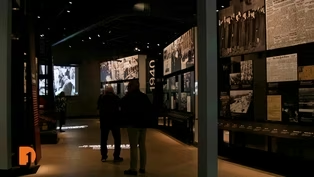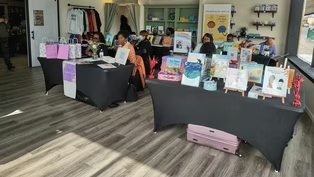
Detroiters asked to weigh in on new election district maps
Clip: Season 8 Episode 33 | 7m 17sVideo has Closed Captions
Detroit residents being asked to weigh in on seven new election maps at public hearings.
Detroit residents are being asked to weigh in on proposed new election district maps. The Michigan Independent Citizens Redistricting Commission is holding public hearings Feb. 21 and 22 in Detroit for residents to provide input on the redrawing of boundaries for seven Michigan House districts. One Detroit contributors Nolan Finley and Stephen Henderson discussed the redistricting process.
Problems playing video? | Closed Captioning Feedback
Problems playing video? | Closed Captioning Feedback
One Detroit is a local public television program presented by Detroit PBS

Detroiters asked to weigh in on new election district maps
Clip: Season 8 Episode 33 | 7m 17sVideo has Closed Captions
Detroit residents are being asked to weigh in on proposed new election district maps. The Michigan Independent Citizens Redistricting Commission is holding public hearings Feb. 21 and 22 in Detroit for residents to provide input on the redrawing of boundaries for seven Michigan House districts. One Detroit contributors Nolan Finley and Stephen Henderson discussed the redistricting process.
Problems playing video? | Closed Captioning Feedback
How to Watch One Detroit
One Detroit is available to stream on pbs.org and the free PBS App, available on iPhone, Apple TV, Android TV, Android smartphones, Amazon Fire TV, Amazon Fire Tablet, Roku, Samsung Smart TV, and Vizio.
Providing Support for PBS.org
Learn Moreabout PBS online sponsorship(light music) - So Nolan, I actually think, I mean, even though this is a do-over technically, and I think there are some people who are kind of claiming victory over the process saying that this process didn't work and that this is proof of it.
I actually think this is exactly the demonstration that we want and need for this community.
We need people to show up for this, but the idea that voters themselves will get to show up and say, "Hey, we like this.
We don't like that.
We would prefer that you gave more weight to this factor than to that factor.
I don't mind you messing up this district, but I don't want you to mess up mine," is a little messy.
But this is the democratic process that I think laid at the foundation of this change, which allows citizens to draw the lines instead of politicians.
If this was under the old system, a bunch of politicians to be in a room with the door closed, they'd fix it the way they want to fix it and no one else would have a say.
- Well, I think this whole redistricting process has proven impervious to fairness.
It doesn't matter who draws 'em, you're gonna have people who say, "We really got to short shaft here."
This is a process.
If you think this is the process we should go through, should have been gone, should have happened two years ago before we've held a round of elections and elected both senators and representatives from these new districts.
Now you gotta throw all that out.
Start over again.
There's a question about whether you're gonna have to hold new Senate races before those terms expire.
You know, was there a better way to do it?
You said politicians in a backdoor room.
Okay, what about politicians or other qualified representatives of the people in an open door room?
The folks that were selected to do this, most of 'em had absolutely no background in politics or in political districting, simply throwing it to the people, all that did was give the consultants, the lawyers, much more influence over the process.
And you see what happened here.
They gave the folks from the Redistricting Commission really bad advice, particularly on the Voting Rights Act and proportional representation.
- Well, I mean, actually two years ago when we went to this the first time, they did do the process right, and they did have citizens show up and say what they wanted and say how they wanted to do.
And in fact, the mistake here that the court points out is not about the Voting Rights Act, which is about the districts you end up with and what they do, it was the process they went through.
They're saying that they relied too much on race in the process, and that that was a violation of the 14th Amendment, which requires a certain level of colorblindness.
And it's an honest mistake.
I mean, what they were trying to do was honor what the constitutional amendment says we want them to do, which is to deemphasize things like political affiliation and geography and create districts that represent communities in a more accurate way.
The truth of the matter is that if you are trying to create the best chance for African Americans in this region to elect people who look like them, you have to think about something more than Detroit now.
That was never true before, but because in the 2020 Census, we saw that for the first time, more African Americans live outside the city than inside, this has implications for the suburbs that it didn't have before.
They did their best to try to represent that.
The court says they did it by relying too much on race.
But I think in terms of the outcome here, what they did made pretty good sense.
But they'll go back and fix it.
And yeah, I would rather have citizens do that than politicians.
I mean, any day of the week.
- Well, you look at the outcome, let's talk about that.
You end up with fewer Black representatives and senators in Lansing, and you end up with Black neighborhoods, Black communities, large number of them represented by white suburban heights.
It didn't produce the sort of broader representation that it should have.
And you have a lot of experts in this state on redistricting.
I think it would've been possible to put together a panel, had we not had this amendment written the way it was, to put together a panel that brought together a bipartisan group of true experts to do this.
And was the old system perfect?
No, but just like the old system, this one's ended up in court at a much later date when it's harder to fix the wrongs, I mean, it's gonna affect more than these 13 houses.
- Yeah, it'll affect the whole region.
- The whole region is touched by this, and we're headed in rapidly headed into primaries, and candidates don't know what the districts are gonna look like.
This is not going to turn out well for representative governing in Michigan.
- Yeah, I mean, the timing is bad and it's unfortunate.
This could have happened earlier if people had gotten their act together to file suit.
I will quibble with the idea that the maps that they had wouldn't have produced over time a better representative sample of actually more people of color in Lansing.
What happened was that, and this happens in every redraw, people have to get used to the idea of those new districts and the chance that they might have to run.
You had a bunch of Detroit representatives who didn't want to campaign in the suburbs, African Americans from the city who didn't feel like they wanted to campaign in the suburbs.
But in subsequent elections, I think what we would've seen would've been African Americans who live in the suburban parts of those districts who would've stepped up and said, "Well, I'm gonna be a candidate for this."
They would've pulled votes from the suburban parts of those districts and parts of the city, and you would've had a new generation of African American leadership.
That was what this commission was looking at.
It didn't work out, but it still may.
I mean, I think there's a possibility that they do it in a way that preserves that opportunity.
Holocaust Center’s revamped exhibit tells survivor stories
Video has Closed Captions
Clip: S8 Ep33 | 7m 43s | Zekelman Holocaust Center re-opens newly renovated exhibit highlighting survivor stories. (7m 43s)
One Detroit Weekend: February 16, 2024
Video has Closed Captions
Clip: S8 Ep33 | 1m 58s | Ways to celebrate Black History Month in and around Detroit throughout February. (1m 58s)
Tapping into Detroit’s techno roots w/producer Carl Craig
Video has Closed Captions
Clip: S8 Ep33 | 5m 25s | Trailblazing Detroit-born techno producer Carl Craig on the Black music experience. (5m 25s)
Providing Support for PBS.org
Learn Moreabout PBS online sponsorship
- News and Public Affairs

Top journalists deliver compelling original analysis of the hour's headlines.

- News and Public Affairs

FRONTLINE is investigative journalism that questions, explains and changes our world.












Support for PBS provided by:
One Detroit is a local public television program presented by Detroit PBS


